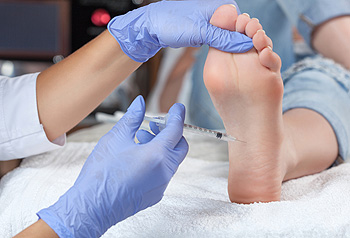6650 Frankford Ave
Philadelphia, PA 19135
 Cuboid syndrome is a condition caused by an injury to the joint and ligaments surrounding the cuboid bone, one of the seven tarsal bones of the foot. Injuries are typically the result of overuse or of spraining the ankle. Cuboid syndrome also appears to be more common in people with pronated, or inward-turned, feet. Symptoms of Cuboid syndrome include pain, swelling, bruising, skin redness and a decreased range of motion in the affected foot. Treatment typically begins at home with resting the foot, applying ice, and compressing and elevating the foot. If pain persists or worsens, schedule an appointment with a podiatrist, who can rule out other conditions, such as a fracture, and perform various treatments to relieve pain and restore function to the foot.
Cuboid syndrome is a condition caused by an injury to the joint and ligaments surrounding the cuboid bone, one of the seven tarsal bones of the foot. Injuries are typically the result of overuse or of spraining the ankle. Cuboid syndrome also appears to be more common in people with pronated, or inward-turned, feet. Symptoms of Cuboid syndrome include pain, swelling, bruising, skin redness and a decreased range of motion in the affected foot. Treatment typically begins at home with resting the foot, applying ice, and compressing and elevating the foot. If pain persists or worsens, schedule an appointment with a podiatrist, who can rule out other conditions, such as a fracture, and perform various treatments to relieve pain and restore function to the foot.
Cuboid syndrome, also known as cuboid subluxation, occurs when the joints and ligaments near the cuboid bone in the foot become torn. If you have cuboid syndrome, consult with John M. Fanelly, DPM from Northeast Philadelphia. Our doctor will assess your condition and provide you with quality foot and ankle treatment.
Cuboid syndrome is a common cause of lateral foot pain, which is pain on the outside of the foot. The condition may happen suddenly due to an ankle sprain, or it may develop slowly overtime from repetitive tension through the bone and surrounding structures.
Causes
The most common causes of cuboid syndrome include:
Symptoms
A common symptom of cuboid syndrome is pain along the outside of the foot which can be felt in the ankle and toes. This pain may create walking difficulties and may cause those with the condition to walk with a limp.
Diagnosis
Diagnosis of cuboid syndrome is often difficult, and it is often misdiagnosed. X-rays, MRIs and CT scans often fail to properly show the cuboid subluxation. Although there isn’t a specific test used to diagnose cuboid syndrome, your podiatrist will usually check if pain is felt while pressing firmly on the cuboid bone of your foot.
Treatment
Just as the range of causes varies widely, so do treatments. Some more common treatments are ice therapy, rest, exercise, taping, and orthotics.
If you have any questions, please feel free to contact our office located in Philadelphia, PA . We offer the newest diagnostic and treatment technologies for all your foot care needs.